When opening a new brokerage account, you usually will be able to choose between a cash account or a margin account. This article will give you an overview of the benefits and disadvantages of a cash account vs margin account. After reading this, you should have a much easier time deciding on which brokerage account type is best for you and your trading style.
What is Margin?
First off, it is important to understand what margin even is. Basically, trading on margin means that you are trading with borrowed funds. So in a margin account, you are eligible to trade with funds that your broker borrows you.
To trade on margin, you normally have to put up some of your own money as collateral. This money is referred to as margin.
Let me give you an example. You want to buy 100 shares of XYZ and XYZ is currently trading at $50. So to purchase the 100 shares, you would normally have to pay $5000 (100 x $50). In a margin account with 50% margin, you could buy the same 100 shares of XYZ for only $2500. The remaining $2500 would be paid by your broker. This means that you have to put up $2500 as margin/collateral.
In other words, trading on margin is a way to increase your buying power. In the previous example, you had to put up 50% margin. This means that your buying power was double of that in a cash account.
All gains made from trades on margin can be kept. You usually don’t have to give the broker a percentage of your profits. The same goes for drawdowns. If you lose money, it is your problem and not your broker’s problem.
Margin can increase both your upside and downside potential. A 50% margin means that you have a 1 to 2 leverage ratio. In other words, one Dollar controls two Dollars. You only have to put up half of the required buying power. Here is another example:
ABC is trading at $100. You buy 100 shares on 50% margin (so with a leverage ratio of 1 to 2). Therefore, you only have to pay $5000. If ABC rises $10, your profit will be $1000 ($10/share). That is a 20% return on capital. Without margin, you would have had to pay $10 000 to achieve the same $1000 profit which means that the return on capital would have been ‘only’ 10%.
As you can see, leverage can increase your gains. With that being said, it is very important to understand that leverage also can increase your losses. Therefore, it is very important to not use too much leverage.
Just like with any borrowed funds, you will have to pay interest on the funds that your broker loans you. The interest rate varies from broker to broker and often the size of your broker account also impacts these rates. An average figure for margin interest rates is around 8-10%.
If you don’t plan on holding your positions for too long, the margin interest isn’t really significant.
The margin that you have to put up to open a position is referred to as the initial margin. After you open a position, you still need to have enough collateral/margin in your account. This is also called maintenance margin.
Cash vs Margin Account Video Breakdown
Watch the following video to learn all the differences between cash and margin accounts:
 What is a Margin Call?
What is a Margin Call?
It is important to understand that margin is not fixed. Margin requirements can change together with price movement. If you enter a trade and it goes against you, your margin requirements will likely increase. This means that you have to put up more collateral. If your account does not have enough capital in it to meet the minimum margin requirements, you will receive a so-called margin call.
This margin call requires you to either deposit more money to the account or close your position(s) so that your account meets the margin requirements again.
If you don’t answer the margin call, your broker will close your position(s) for you.
Generally, in margin accounts, your broker can close positions that he finds too risky. This does not happen very often. But theoretically, the broker has the right to do this to clients with margin accounts. So even if your broker initially gives you a few days to answer a margin call, he may close your position(s) before.
What is a Cash Account?

A cash account is a normal brokerage account like everyone knows it. There is nothing really special about this account type. In a cash account, you always have to put up enough capital to cover an entire position. So to purchase 100 shares of a $100 stock, you would have to pay $10 000.
A cash account holder is not permitted to borrow any funds from his/her broker. Leverage is not available in cash accounts meaning that every $1 controls $1. The buying power in cash accounts is fixed to the deposited money, whereas the total buying power in a margin account is the deposited margin together with the potential borrowable funds from your broker. The buying power in a margin account with 50% margin would be double the buying power in a cash account.
As you can see, a cash account is much more straightforward and easier to understand than a margin account.
With that being said, there are some limitations in cash accounts. For instance, as you can’t borrow anything from your broker, you are not permitted to short sell in cash accounts. Furthermore, there are other disadvantages and limitations. But more on the pros and cons of a cash account vs margin account in a few moments.
Do you need a Cash Account vs Margin Account?
There is no one correct answer to this question. It all comes down to your personal preferences.
To help you with your decision, I will now list and explain all the pros and cons of a cash vs margin account.
Pros of a Margin Account
- Flexibility: Margin accounts are very flexible. You can trade any strategy in a margin account. For instance, short selling and all option strategies are allowed in margin accounts. This is not the case for cash accounts
- Increased Buying Power: The buying power in a margin account is greater than that in a cash account. This allows you to do more with your capital.
Cons of a Margin Account
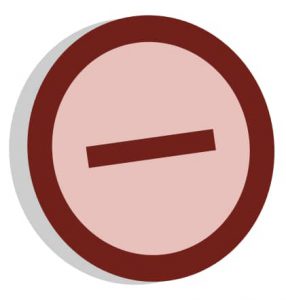 More Risk: Together with increased profit potential, comes an increase in risk. If you use leverage and aren’t completely aware of what you are doing, the consequences can be disastrous. Therefore, it is very important to know what you are doing. Furthermore, you should never use too much leverage.
More Risk: Together with increased profit potential, comes an increase in risk. If you use leverage and aren’t completely aware of what you are doing, the consequences can be disastrous. Therefore, it is very important to know what you are doing. Furthermore, you should never use too much leverage.- Complicated: You probably already noticed that margin accounts aren’t near as easy to understand as cash accounts. It is very important to understand how margin works if you are planning on trading in a margin account.
- Minimum Equity: To use margin privileges, you will need to have a minimum equity amount in your account. This minimum figure depends on the broker, however, a common amount is $2000.
- Broker Has Control: If a position goes against you, you may be required to deposit more or free up money to your broker account. To manage his risk, your broker is allowed to close your positions without your consent. This can’t happen in a cash account.
- Interest Rates: As you are borrowing money from your broker, you will have to pay interest on the borrowed money. Depending on your strategy, the interest payments may be significant or not.
Pros of a Cash Account
- Limited Risk: One advantage of cash accounts is that you can’t lose more than your initial investment.
- Easier to Understand: Cash accounts are very straightforward. You deposit money and that is the money you can trade with.
Cons of a Cash Account
- Limitations: Apart from some simple buying strategies, you can’t really do a whole lot more in cash accounts. You can’t short sell or trade any ‘advanced’ options strategies.
- Less Buying Power: You don’t have more buying power than the money that you deposited to your account. So by opening a cash account instead of a margin account, you have less buying power.
- Settlement: The funds that you trade with, in a cash account, take time to settle. This means that you can’t immediately use the money that you traded with to trade with again. Often you have to wait a few days. The time that the funds take to settle depends on the asset. This is especially annoying for active traders.
Pros and Cons Overview
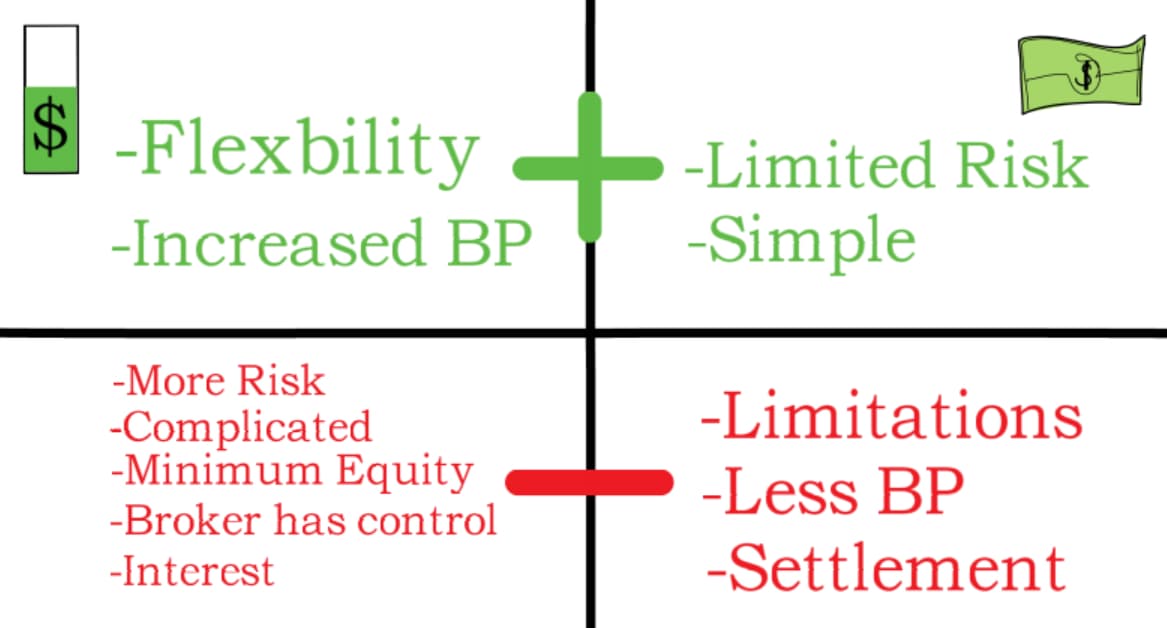
Still don’t know which Account Type is best for you?
That’s okay. You now know the pros and cons of these different account types. The next step is evaluating the different advantages and disadvantages. This is something you have to do on your own since the pros and cons can be more and less significant for different people.
For instance, if you are planning on buying and short selling, you will need a margin account. The same goes for option traders. If you want the possibility to sell options which is very desirable for options traders, then you need a margin account.
Generally speaking, a margin account gives you more possibilities.
On the other hand, if you are just planning on buying a few stocks and holding them for the very long-term, a cash account may be a better choice than a margin account. The interest that you have to pay could otherwise, impact your long-term profits negatively.
Hopefully, these two examples make it clear that this really depends on your personal preferences.
If you want to learn about even more common account types like Retirement Accounts, Joint Accounts, Trust Accounts and more, you should check out my broker account type guide.
How to use Margin – Understanding the Risks
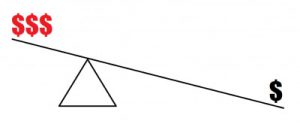
If you decide to go with a margin account, it is very important to understand the risks. In the following paragraphs, I will present a few things to look out for when trading in a margin account.
First of all, it is very important to not use too much leverage. Leverage can magnify your gains AND LOSSES. Don’t just think about the potential upside. Take the potential downside into account as well.
If a broker allows you to trade with a leverage ratio of 1 to 50, you probably should not use that leverage. Just think about it, every $1 move down will equal a $50 loss per share with that kind of leverage ratio.
Trading with too much leverage can be very risky. In my opinion, it is not necessary to use leverage for normal stock trading. If you aren’t profitable without leverage, you won’t become profitable just by using leverage.
Many Forex brokers allow you to use insane leverage ratios. The Forex market usually isn’t as volatile as the equity market. Therefore, it is acceptable to use some leverage when trading Forex. Nevertheless, I can’t recommend anyone using crazy leverage ratios like 1 to 100 or anything similar.
In general, I can’t recommend using a broker that offers too high leverage. If a broker offers very high leverage ratios, he is not regulated by trustworthy regulators like the SEC or FINRA.
Just think about this for a second: when you sign up to a broker, you will have to identify yourself with a social security number, a picture of your password and/or similar. Why would a trustworthy broker lend you multiple hundred times your money or even more? Would you lend someone 100 times his money to trade with?
I doubt that you would. If a broker does this, there has to be something shady going on. Otherwise, he wouldn’t allow you to trade with leverage ratios such as 1 to 100.
That is also why in recent years a lot of regulations for leverage and margin have been created. There have come leverage caps and similar new rules. If you want to learn more about recent regulations in the EU, make sure to check out my article on the new ESMA regulations.
How to use Leverage without blowing up
In my opinion, trading with leverage can be done a right and a wrong way.
Let’s start with the wrong way to use leverage. Here is an example:
XYZ is trading at $100 and Peter is planning on buying it. Peter’s initial plan was to buy 100 shares (which would set him back $10 000 in a cash account). However, Peter realizes that he has access to leverage with a ratio of 1 to 5. Therefore, he now plans on buying 500 shares. Due to the 1 to 5 leverage ratio, Peter would only have to put up $10 000 as margin.
What’s wrong with this, you may ask yourself. Well, Peter just increased his risk by five times. Instead of scaling up your position size, I recommend scaling down the required money. Let me give you an example of what I recommend to do:
Peter still wants to buy XYZ which is still trading at $100. His initial plan was to buy 100 shares and I recommend sticking with this plan even though he has access to leverage. If he buys the same 100 shares with leverage, he will be required to put up much less margin. With the leverage ratio 1 to 5, he will only have to put up $2000 to buy 100 shares of XYZ.
By doing this, Peter’s risk stays the same, but he has to put up less capital. By putting up less capital, he can use the remaining capital for other trades.
I hope you understand what I am trying to say. You should not increase your risk just because you have access to leverage. Rather decrease the capital used per trade.
Conclusion
Summed up, if you plan on opening a margin account, it is important to keep your position sizing and risk under control. Avoid using too much leverage and even think about avoiding brokers that allow a lot of sketchy leverage.
Furthermore, try to keep an eye on your margin requirements, so that you won’t receive a margin call or risk that your broker will close positions for you.
And always, regardless of account type, make sure that you know what you are doing before you risk any real money!!!
I truly hope, I could help you understand the differences between cash vs margin accounts.
Do you now know which account is best for you?
Let me know in the comment section below! If you still can’t decide, I could try to help you personally if you outline your situation in the comment section.

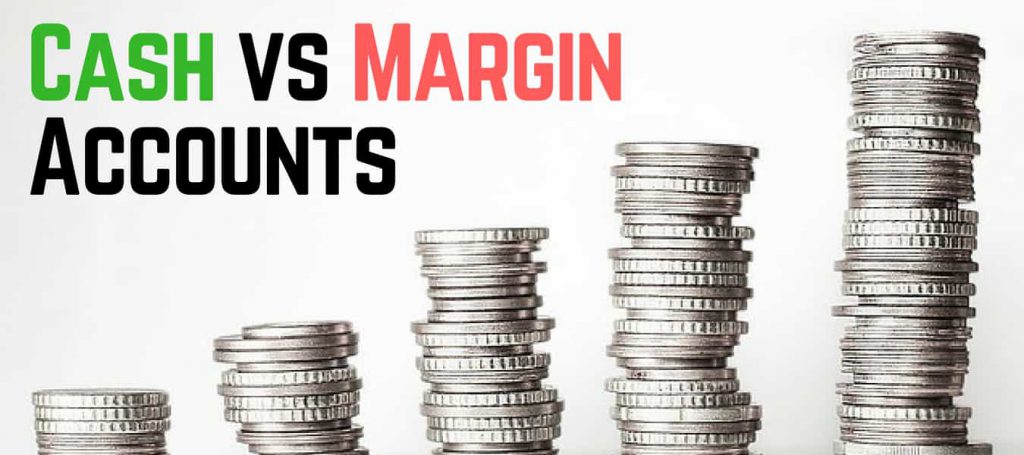
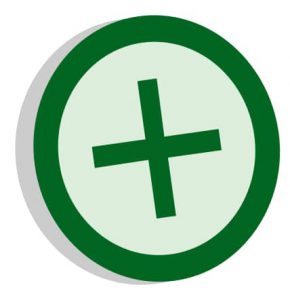
I like this way of money to be earned using this cash verse margin account. Gives you a break down how you can start account that allows you to start learning how to earn with small amounts of money you put in it. This has a lot of good information and catches your eye when reading the website. Has good content and helps others understand more what and how make your money grown in account like this.
Thanks for the positive feedback. It is very good to hear that you are enjoying my content!
Thank you to give main strategies to get leverage in trading .I’m really interesting about starting trade,but I’ve some worries at all. Can you please add some mini video explaining more some ideas ?
The way you explain is great,but curiously I would like to get more confidence when I have to sign and start my first session ,with low risk to lose my money
Thank you !
Hey and thanks for the feedback.
I was actually thinking of adding video lessons to my articles in the near future. But for now, I only have written education. I just added some interactive quizzes at the end of the beginner and intermediate course. I hope that for now, you still can enjoy the education.
Hi Louis,
Can you please explain this part again? maybe with math:
If a trader wants to use 200$ for 5 shares and then gets access to 1:2 leverage, it is not smart to use the entire 200$ to buy 10 shares instead. It is much better to scale down the money until it is the same amount of shares; so 100$ for 5 shares. Don’t increase position size, just decrease the price. Before entering think about a position size that you could do without margin and then do that with margin but for less money.
Thank you!!
Sure thing Maria.
In that paragraph, I am trying to explain how to use leverage. Leverage allows you to trade with borrowed money. A 1 to 2 leverage would mean that you only have to pay $1 to control $2. So to buy one share of a $100 stock, you would only have to pay $50 with a leverage of 1 to 2.
Most people that have access to such leverage use it the wrong way. They scale up their entire position size. Here is an example:
XYZ is trading for $100 and you want to buy it. You have $10 000 in your account and you could buy 100 shares of XYZ. However, with a 1 to 2 leverage, you could buy 200 shares instead of only 100 shares. I recommend still only buying 100 shares though. The problem with buying 200 shares is that you thereby double your risk.
I recommend using leverage to increase your overall buying power and not to increase the risk on a single position. If you have access to a 1 to 2 leverage but still only buy 100 shares, you could still use the other half of your account for other trading activities.
In other words, don’t increase your risk just because you have access to leverage. Rather decrease the capital used per trade.
I hope this makes sense. Otherwise, let me know.
Louis this is a great explanation, I really was unclear about the 2 differences between a cash and margin account. I think as someone new to trading I think I’d prefer the lower risk of a cash account. Your comparison of the pros and cons was particularly helpful, thank you!
However, a question, can you change your account type at a later date?
Awesome to hear that my explanation could help you out.
Usually, brokers will require you to open a new account instead of changing your current account type. So often, you would have to allocate the money from your old account to the new account. But there are probably some brokers that allow you to change account type without having to create a new account.
Hey there! Thanks for these detailed breakdowns of cash vs margin accounts. When I first heard of trading, it was the hardest concept to understand. Your guide has helped me get it and I really appreciate the breakdowns. I’ve decided that I like the cash route as it is lower risk. I’m still a bit shaky about this whole investing thing as I’m not a big risk taker in the first place but I’ve heard that you can make good money if done right so I want to try!
Your site has helped me out a lot and I appreciate your time to write these detailed reports and guides.
Marlinda
Hi Marlinda,
My tip for you would be to start out very small! In the beginning, there will be some volatility in your trading results. So make sure to not risk money that you can’t afford to lose. Alternatively, you could also start out by paper trading (trading with virtual money).
Are there advantages to a cash/margin account, when you take into account what type of stock you want to buy? For example, if i want to purchase stock from Google or Apple (or the respective companies that own them), is there a better account for those types of stock. Or is all stock really just stock, and so it doesn’t matter?
Thanks!
Thanks for the question Cyrus. There isn’t really a difference between individual stocks in cash and margin accounts. The only thing that I could think off is that depending on your account size you might not be able to trade high priced stocks with size in cash accounts as small accounts won’t have the buying power to buy more than a few shares of $200+ priced stocks. However, generally speaking, it isn’t the case that certain account types are better suited for specific stocks.
I have looked into this type of investing (margin), it is too risky for me at this time in my life. The idea of margin buying is still quite new to me and when I start making I will remember your site. A lot information to digest, so I will be back as soon as I am able to buy into this idea. Your site is clean and well designed.
I am very happy to hear that you like the design of my site.
thank you louis for your knowledge of the margin vs cash acct. i am a options student, to which i am in simulator presently. i am still a little confused or disappointed, my trade personality is the do credit trades(shorting). with a cash acct, shorting is not allowed, with a margin acct, it is.
the broker comes out ahead wether i lose or win in a trade. wasen,t there a time when there was a leverage acct choice? or am i thinking futures?
with options, the trade is at least 30days, or if you desire to exist trade at a % profit. staying in a trade for 30days with a 8-10% fee from broker, will get up profit. its a hard decision. cash, no leverage. margain with leverage 2/1, with interest owed to broker. isn,t there a third choice?
Thanks for your comment.
You can only use leverage in margin accounts, not in cash accounts. So if you want to use leverage, you have to choose a margin account. I don’t know if you are talking about a specific broker. But the brokers that I know allow you to stay in your options positions as long or as short as you want to. It is not restricted to a minimum of 30 days. If I wanted to, I could open an option position and close it again immediately.
Furthermore, if you only hold your positions for 30 days, the interest rates aren’t that bad. Like I mentioned in the article, a common figure for the margin rates is 8% annually. This means if you would hold your position for an entire year, you would have to pay 8% on the borrowed money. But if you only hold your position for 30 days, the interest is very small (about 0.5%). But note that you only have to pay interest if you borrow money. If you don’t trade with any borrowed money, you wouldn’t have to pay any interest at all.
I hope this helps. Please let me know if you have any other questions or comments.
I know this article is a couple of years old but hope it’s still active.
I always planned on using a cash account until I realised that it can’t be used to short shares (there is also the settlement lag) so I need a margin account but not so much for the leverage. My question therefore is can you choose whether to use the leverage on offer? – so leaving shorting aside for the moment if I deposit $5000 with 2-1 leverage and simply buy $2000 worth of shares am I automatically borrowing $1000 (and therefore pay interest) ? Or is borrowing triggered above $5000 ? And when I do decide to short am I paying interest on the sale of the borrowed shares for as long as those shares are borrowed ?
Thanks.
Thanks for your comment Steve. The answer to your question might vary from broker to broker.
When you trade, you normally choose your position size in terms of shares (or contracts…). So let’s say you want to buy 100 shares of a $20 stock. In a cash account, you would have to pay the entire $2000 for this position. However, in a margin account, your buying power would only be reduced by $1000 (assuming that you trade on 50% margin). So theoretically, you are automatically borrowing $1000. However, as long as your account has more than enough capital to cover the entire position, you aren’t really borrowing money. You first really start borrowing money when your total allocated capital exceeds your actual account capital.
And yes, you are paying interest on the borrowed shares for as long as you are borrowing them.
But like I said in the beginning, these things can be different depending on the broker. So I recommend asking your broker to learn all the specifics about your situation.
I hope this helps.
Hi Louis
Thank you very much for your article. I just solved my problems.
I decided to open 1 margin account and 1 cash account as I really hate borrowing.
Will only use the margin account for option tradings that are not allowed under cash account like selling “Put”.
Best regards.
Hi,
Thanks for your comment. That sounds like a good plan. But note that most brokers also allow you to trade without margin in a margin account as long as your funds can cover your entire position.